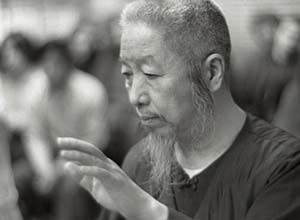The Spirit of Cheng Man Ching
The following is a tribute to the spirit of Cheng Man Ching taken from the program booklet of the 2nd European Cheng Man Ching Forum and Tournament in 2004.
At All Good Tai Chi we also honor his spirit.
The Short Form
According to Cheng Man Ching
By Daniel Grolle
Opinions differ about Cheng Man Ching. Can somebody who doesn’t belong to ancient martial arts family really be a Great Master? Can somebody who didn’t even reach the age of 80 be a Chinese Master? Can somebody really be a Master who is reputed to have drunk, who was one of the first to have transmitted his knowledge to Westerners, who associated with long-haired savages, freaks who opposed the Vietnam war? How can somebody really be a martial arts Master when he obviously had time to write poems, to be one of the most renowned traditional Chinese doctors in Taiwan, and on top of everything, to be a brilliant calligrapher? An exception in the otherwise rather specialized world of Tai Chi. Imagine a top football player who writes poems, chairs a medical association, and is a nationally known painter! This man breathed a spirit that brought him great admiration and reverence, as well as misunderstanding and contempt. This man captured his spirit in a bottle and threw it, well-corked, into the sea of martial arts history.
When my great-aunt and teacher Christel Proksch first uncorked this bottle for me, it was simply what the label said: Tai Chi Chuan. Only years later, after having met many other players, did I discover an astonishing similarity among those who come from the Cheng Man Ching tradition. It wasn’t just that I knew their form and didn’t know others, it was a remarkable similarity in attitude. At Tai Chi camps, for example, where one exchanges ideas instead of competing, or where people work with openness and a spirit of inquiry on the Tai Chi principles instead of techniques. One often seems to meet students of Cheng Man Ching at such places.
In this tradition, one isn’t merely confronted with a single great deceased Master, instead one finds a multitude of very highly developed schools and individual teachers, who communicate among themselves, at least to a degree, and who are part of a wonderful common process of growth and development. During the 25 years in which I’ve been practicing Tai Chi, I’ve had the good fortune to meet with a number of experienced Tai Chi players who studied with Cheng Man Ching himself. And in all of these people, the “big bang” of their encounter with the great master still echoes. Some of them, like my teacher Ben Lo, were so affected by the experience, that one might even fear for their identity. Whenever Ben Lo talks about himself or Tai Chi, it’s very likely that he’ll begin the sentence with the name of the “Professor.” Today, Cheng Man Ching’s third-generation students are often completely unaware of this amazing power belonging to their spiritual grandfather. Epi van de Pol is working on a book, in which he wants to collect all of the stories about the master. Wolfe Lowenthal has written two moving books about his experiences with Cheng Man Ching, the first of which, “There Are No Secrets,” I recommend highly to all my students.
And finally, there‘s the Cheng Man Ching Forum, for the second time now, where we students, grandchildren and great-grandchildren try to preserve and strengthen our inheritance.
Let us be gentle and strong in the spirit of Cheng Man Ching!
2ND EUROPEAN CHENG MAN CHING FORUM MEETING AND TOURNAMENT FROM 2004 IN HANNOVER, GERMANY
2004 Cheng Man Ching Forum Program Booklet.pdf

